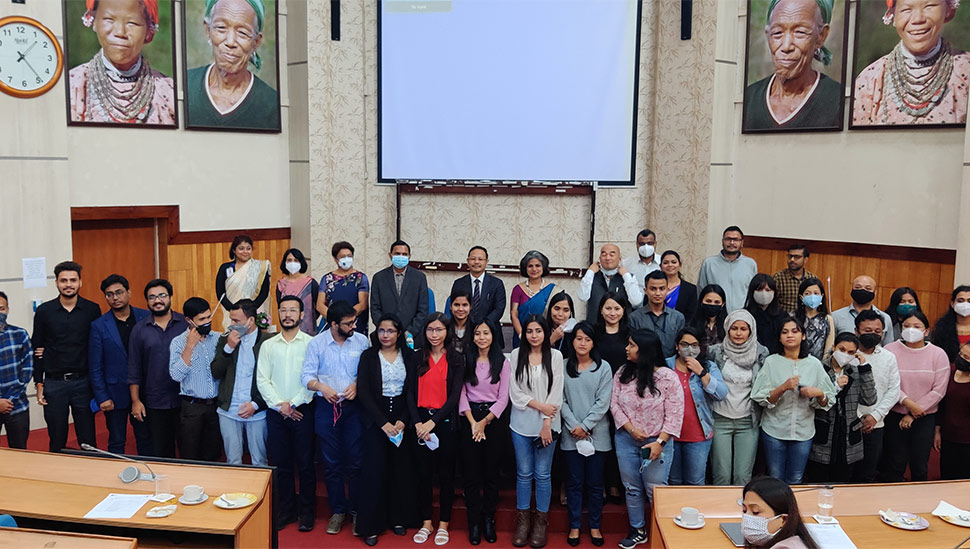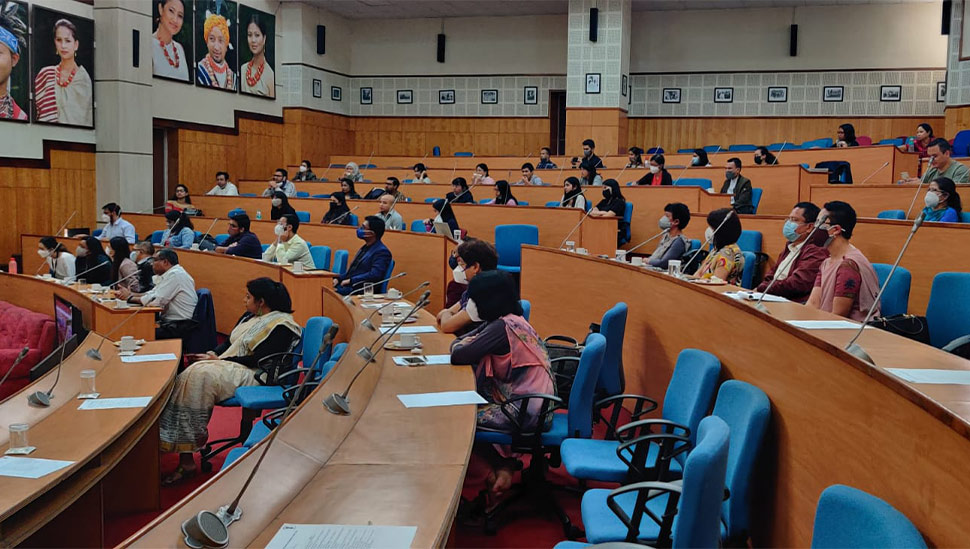James Sangma emphasizes on importance of strengthening public health in Meghalaya

Meghalaya Health Minister James PK Sangma on Monday stressed on the importance of strengthening public health initiatives in the State. He emphasised the importance of building the primary sector by directing health expenditure towards not only strengthening the tertiary but more so, the primary aspects of healthcare. It may be recalled that Meghalaya was declared last month as one of the Top 3 States among Small State Categories with highest hospitalization rate, indicating effective implementation of the health insurance programme.
While speaking as chief guest at a programme organised by Indian Institute of Public Health- Shillong (IIPH-S) to highlight public health concerns in the State, the Minister rued the fact that in Meghalaya only 12% students have been found to take up Science stream in +2. Directing attention to this, the Minister stated, “Science and Mathematics are subjects that will be key drivers of growth and development of human civilization. They will aid in providing effective and concrete solutions to complex problems associated with not only health but also other complex problems like climate change and environmental concerns”.
It may be mentioned that an assessment of Meghalaya MBOSE +2 results 2020 reveals that only 12% of students in Meghalaya took up Science Stream while 7% opted for the Commerce stream, and a whopping 81% students belonged to the Arts Stream. Alternatively, in more developed States such as Tamil nadu, Kerala, Karnataka and Maharashtra, the percentage of science +2 students ranges between 70-85%.
It may be mentioned that IIPH-Shillong is launching a Bachelors in Public Health (BPH) programme from this year, with an intention to create opportunities for Science Students in State while also addressing the shortage of public health experts. Therefore, in order to encourage more students, especially from marginalised communities in rural areas, to pursue career avenues in science stream, the Minister, while appreciating IIPH’s initiative, assured that he would also initiate discussion with the Chief Minister on possibilities of providing scholarships to them.
While congratulating the 1st batch of Masters in Public Health (MPH) students on successfully completing their degree from IIPH-Shillong, the Minister commended IIPH-Shillong for its support to the State Health & Family Welfare Department through their expertise in the realm of research and academia in various domains of public health.

The programme commenced with a welcome speech by Dr. Melissa Glenda Lewis, and an address by Dr. Sandra Albert, Director, IIPH-Shillong. Valuable analysis and presentations were given by the 1st batch of graduated MPH students on a range of public health issues in the State including- Birth Preparedness and Complication Readiness among Women; Assessment of Janani Shishu Suraksha Karyakram (JSSK) Scheme; institutional delivery, IMR and MMR; Trends of Scrub Typhus Cases from 2017-2020 in a tertiary care hospital and COVID-19 in Meghalaya: A Summary of Research Activities conducted by IIPH-Shillong.
The Minister appreciated the analysis presented by IIPH-Shillong and stated that their presentations had given valuable insights on the need to address demand-side health issues and strengthen communities for overall wellbeing of the State.
The Principal Health Secretary, Sampath Kumar, IAS, who was the Guest of Honour, said that Meghalaya stands in the 4th position among all states in terms of Government budget spending on healthcare and the focus now should be on the fact as to how we can improve our health indicators with increased spending. He further stated, “Collaboration between various stakeholders as well as between Government line departments is the key to improve health indicators in the State. There should be a motivation and an intrinsic desire among functionaries to improve health indicators”.
Giving an example of how a collaborative effort has reaped good results in the past, the Principal Health Secretary stated that Meghalaya faced several challenges with respect to achieving full immunization coverage for children. However, between 2019-2020, when the issue was taken up on a mission mode and solved through collaborative efforts, in just 6 months, the State was able to achieve 90 pc child immunization coverage. The State’s ranking jumped from the bottom to 2nd in the National immunization ranking.
He also highlighted how Meghalaya can learn from what Costa Rica has to offer in terms of an efficient health care system that has integrated public health and medical care, centered around a backbone of robust, community-oriented primary health care, characterized by strong and effective use of health workers to improve access, quality, and equity. In Costa Rica, public health has been a priority for decades and its average life expectancy is 80.28 years, which is higher than even a developed country like the United States with a life expectancy of 78.79 years.
He recalled that when Meghalaya brought its own health policy in 2020, the State took a leap towards addressing the demand and supply gap in healthcare, which is crucial for creating a holistic ecosystem for improving key health indicators of the State. For implementing this, the State has adopted a collaborative approach whereby engagement and awareness of communities through involvement of women-led Self-Help Groups (SHGs) and traditional institutions is being intensively undertaken.

The programme witnessed participation and interaction among key officials of the Directorate of Health Services (DHS), NHM-Meghalaya, including officials from the Health Department along with the students and faculty members of IIPH-Shillong.

Leave a Reply